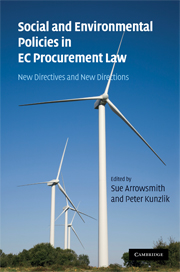Book contents
- Frontmatter
- Contents
- Contributors to the volume
- Preface
- Chronological table of cases
- Table of European legislation
- Table of UK legislation
- Editors' Note – the decision in Rüffert v. Land Niedersachsen
- 1 Public procurement and horizontal policies in EC law: general principles
- 2 EC regulation of public procurement
- 3 A taxonomy of horizontal policies in public procurement
- 4 Application of the EC Treaty and directives to horizontal policies: a critical review
- 5 The impact of the EC state aid rules on horizontal policies in public procurement
- 6 EC public procurement law and equality linkages: foundations for interpretation
- 7 Disability issues in public procurement
- 8 The legality of SME development policies under EC procurement law
- 9 The procurement of ‘green’ energy
- 10 Reconciling national autonomy and trade integration in the context of eco-labelling
- 11 CSR in the utilities sector and the implications of EC procurement policy: a framework for debate
- 12 Coordinating public procurement to support EU objectives – a first step? The case of exclusions for serious criminal offences
- Index
- References
5 - The impact of the EC state aid rules on horizontal policies in public procurement
Published online by Cambridge University Press: 06 September 2009
- Frontmatter
- Contents
- Contributors to the volume
- Preface
- Chronological table of cases
- Table of European legislation
- Table of UK legislation
- Editors' Note – the decision in Rüffert v. Land Niedersachsen
- 1 Public procurement and horizontal policies in EC law: general principles
- 2 EC regulation of public procurement
- 3 A taxonomy of horizontal policies in public procurement
- 4 Application of the EC Treaty and directives to horizontal policies: a critical review
- 5 The impact of the EC state aid rules on horizontal policies in public procurement
- 6 EC public procurement law and equality linkages: foundations for interpretation
- 7 Disability issues in public procurement
- 8 The legality of SME development policies under EC procurement law
- 9 The procurement of ‘green’ energy
- 10 Reconciling national autonomy and trade integration in the context of eco-labelling
- 11 CSR in the utilities sector and the implications of EC procurement policy: a framework for debate
- 12 Coordinating public procurement to support EU objectives – a first step? The case of exclusions for serious criminal offences
- Index
- References
Summary
Introduction
The question as to whether and, if so, how the EC rules on state aid affect the application of horizontal policies in public procurement is highly controversial and, regrettably, still subject to a considerable degree of legal uncertainty. In essence, the argument turns on the question whether a Member State purchasing goods or services within a public procurement procedure grants an unjustified economic advantage to the successful bidder when it awards the contract on the basis of horizontal criteria. It is generally assumed that by doing so the procuring entity usually pays a higher price than it would have had to pay without the use of the horizontal policy. Arguably, this overcompensation would put the bidder at a competitive advantage vis-à-vis its competitors thus resulting in a distortion of competition. On the other hand, however, it is obvious that the application of the EC state aid rules to horizontal policies would de facto put an end to the use of horizontal policies in public procurement. Procurement measures involving state aid would have to be notified to the European Commission (the Commission) under Article 88 EC Treaty and could not be implemented before the Commission had cleared the measures – a procedure that may last several years. This chapter aims to summarise the debate and to provide a clearer picture as to what policies the Member States are entitled to pursue without falling foul of the EC Treaty's rules on state aid.
- Type
- Chapter
- Information
- Social and Environmental Policies in EC Procurement LawNew Directives and New Directions, pp. 249 - 270Publisher: Cambridge University PressPrint publication year: 2009
References
- 1
- Cited by

